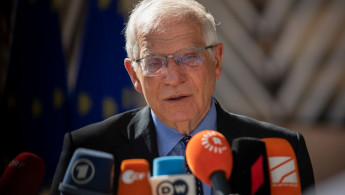Iran: EU foreign policy chief to visit Tehran as efforts to revive nuclear deal continue
Iran said European Union foreign policy chief Josep Borrell will travel to Tehran on Friday for discussions on efforts to revive the country's 2015 nuclear deal.
Borrell would arrive in the Iranian capital at night before meeting Foreign Minister Hossein Amir-Abdollahian and other officials, foreign ministry spokesman Saeed Khatibzadeh said in a statement.
"The visit, which is part of ongoing consultations between Iran and the European Union, will focus on bilateral relations, some regional and international issues, as well as the latest status of negotiations to lift sanctions," said the statement.
News of the previously unannounced visit comes after Amir-Abdollahian said last week that Iran still believes the negotiations can succeed.
The talks in Vienna, which began in April last year, aim to return the United States to the nuclear deal, including through the lifting of sanctions on Iran, and to ensure Tehran's full compliance with its commitments.
The negotiations have been stalled since March amid differences between Tehran and Washington, most notably due to a demand by Iran to remove its Islamic Revolutionary Guard Corps from a US terror list.
Amir-Abdollahian on Wednesday said Iran was "serious" about reaching an agreement in the negotiations.
"The nuclear negotiations train has reached difficult stops as they near the end," he said.
Also on Wednesday, Enrique Mora, the European Union's coordinator for the talks, posted on Twitter a picture of himself together with Borrell and US negotiator Robert Malley in Brussels.
"In depth conversation about #JCPOA and regional perspectives in the wider Middle East. Malley reiterated firm US commitment to come back to the deal," he wrote.
The deal known formally as the Joint Comprehensive Plan of Action, or JCPOA, gave Iran relief from sanctions in return for guarantees it could not develop a nuclear weapon - something Tehran has always denied wanting to do.
The United States unilaterally withdrew from the nuclear deal in 2018 under then president Donald Trump, before imposing waves of biting sanctions on the Islamic republic.





 Follow the Middle East's top stories in English at The New Arab on Google News
Follow the Middle East's top stories in English at The New Arab on Google News
![The UAE is widely suspected of arming the RSF militia [Getty]](/sites/default/files/styles/image_330x185/public/2024-11/GettyImages-472529908.jpg?h=69f2b9d0&itok=Yauw3YTG)
![Netanyahu furiously denounced the ICC [Getty]](/sites/default/files/styles/image_330x185/public/2024-11/GettyImages-2169352575.jpg?h=199d8c1f&itok=-vRiruf5)
![Both Hamas and the Palestinian Authority welcomed the ICC arrest warrants [Getty]](/sites/default/files/styles/image_330x185/public/2024-11/GettyImages-2178351173.jpg?h=199d8c1f&itok=TV858iVg)